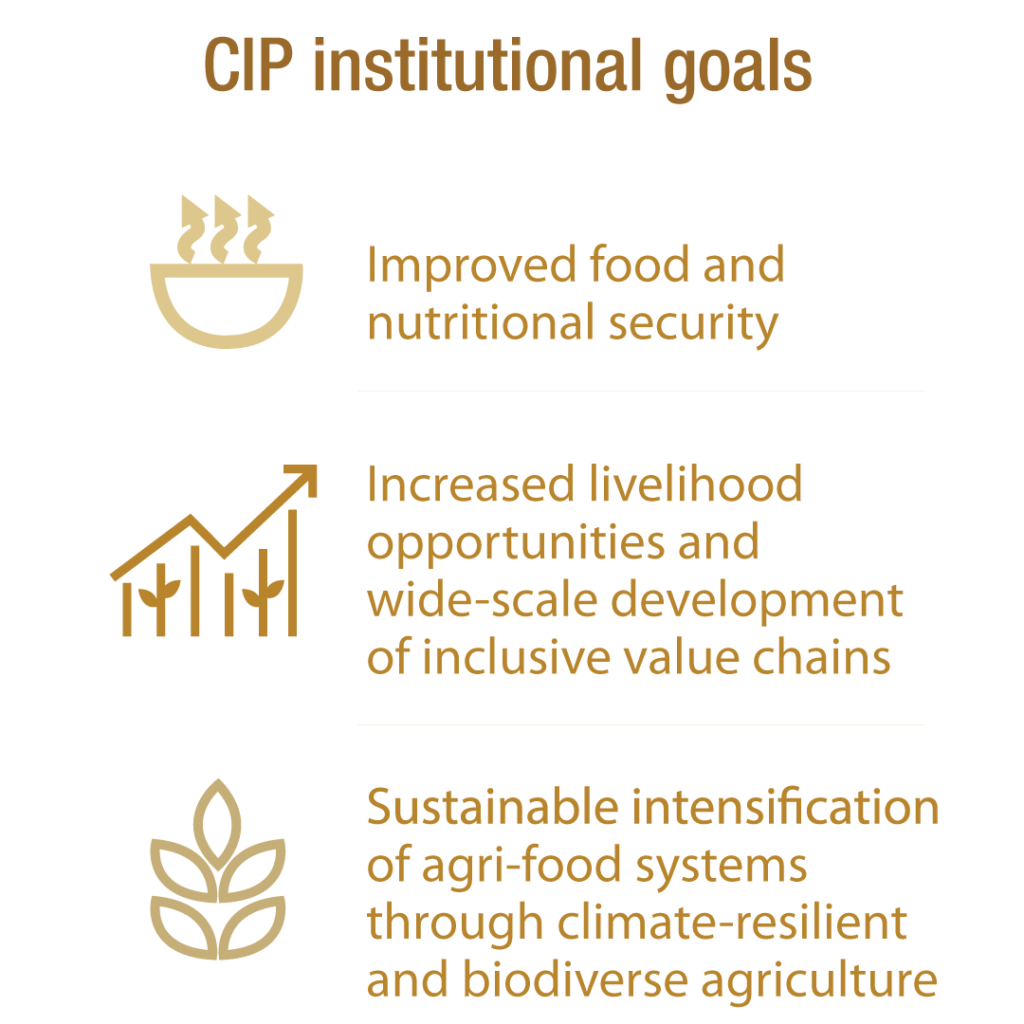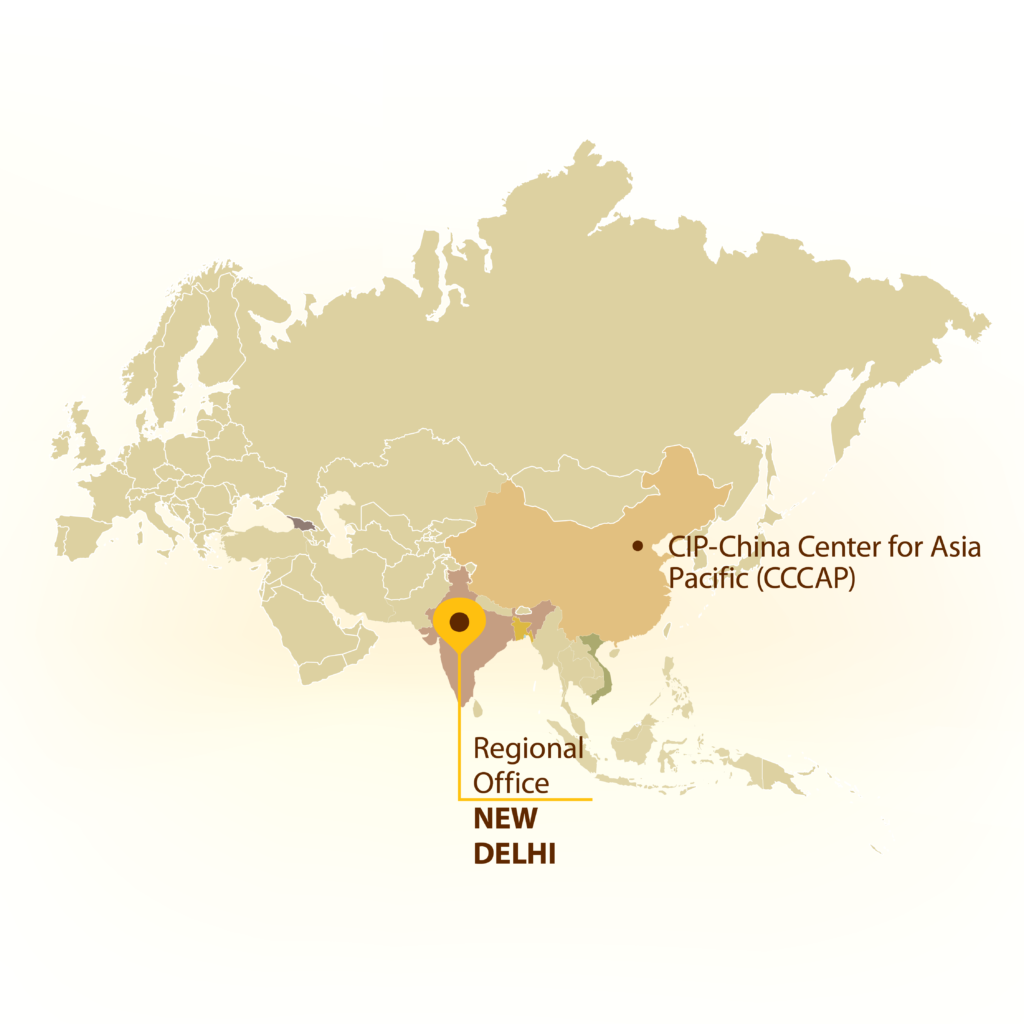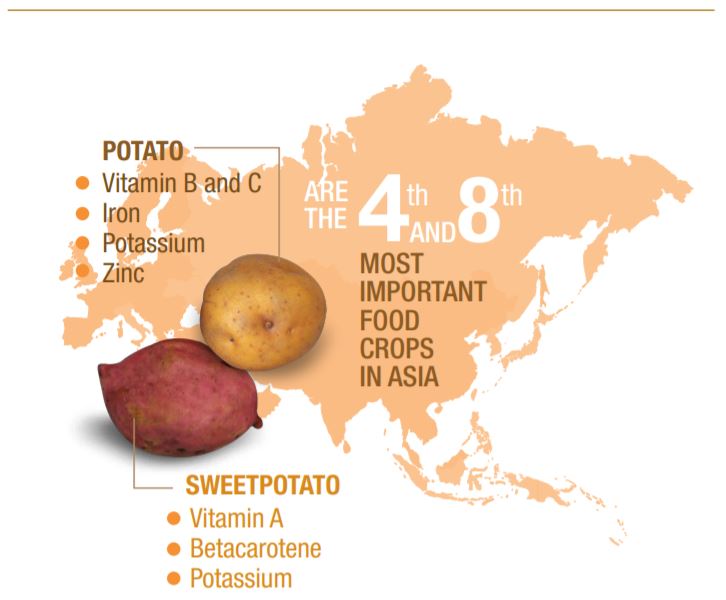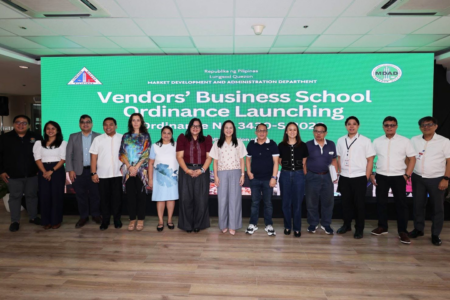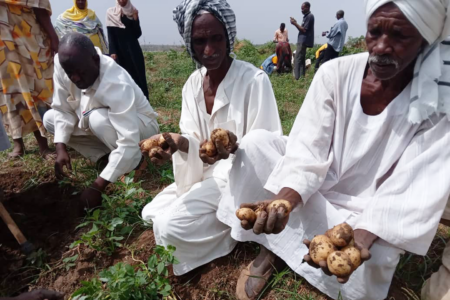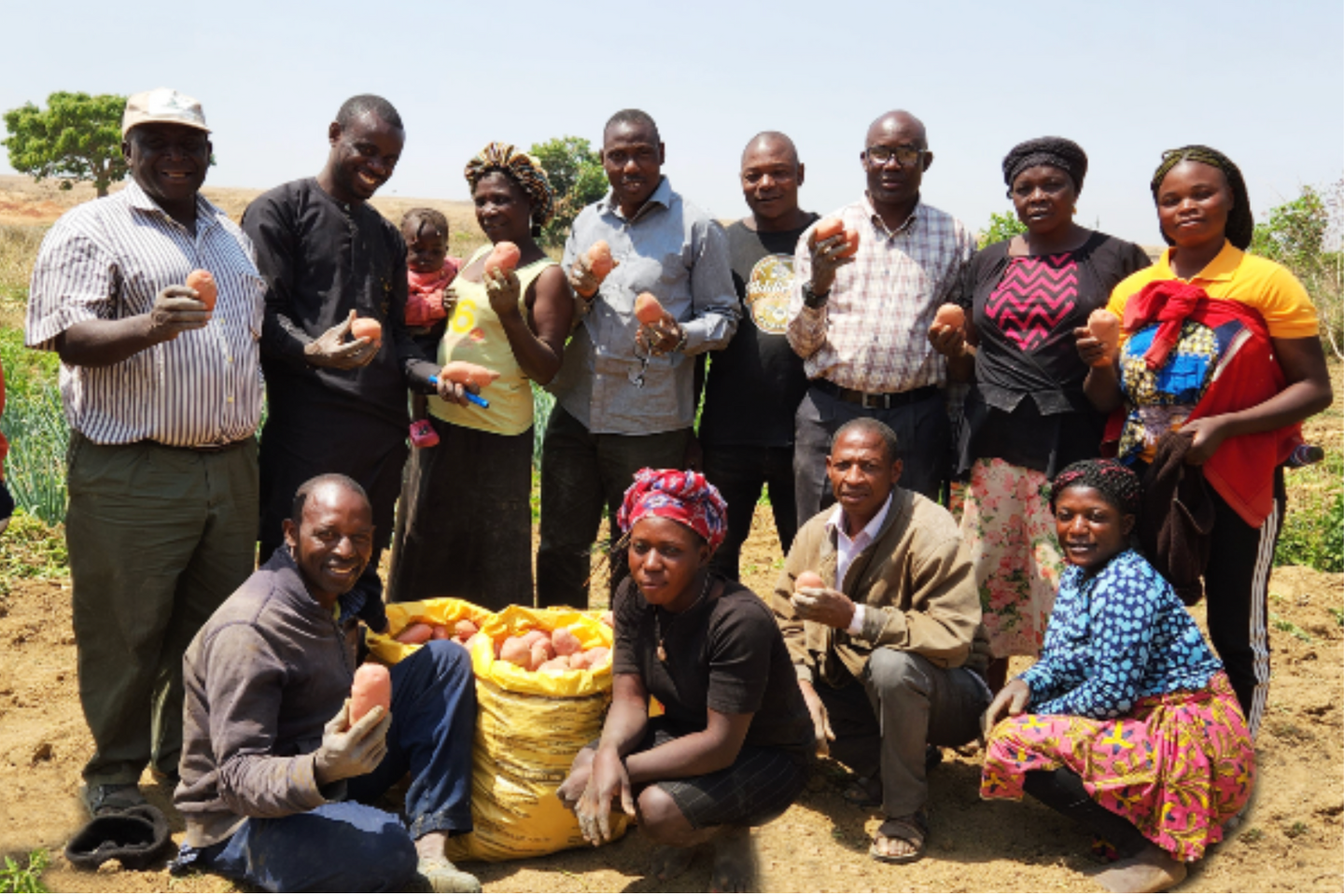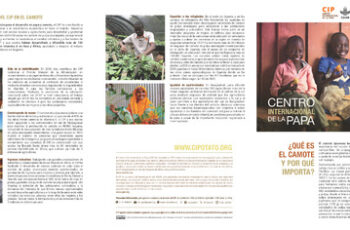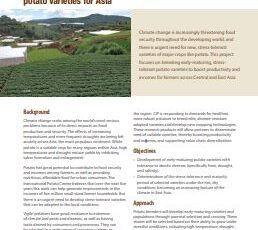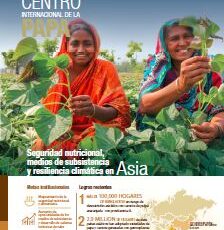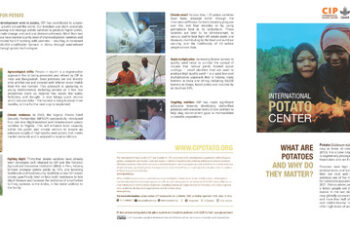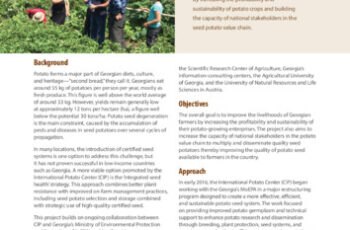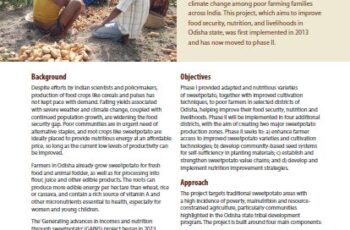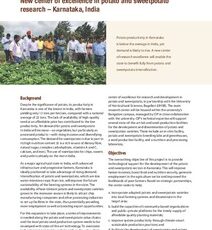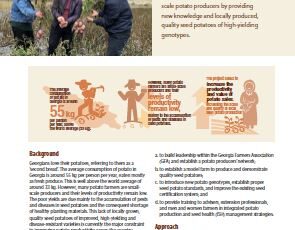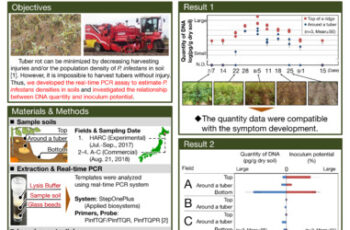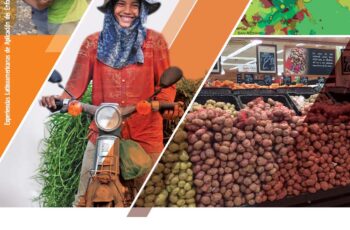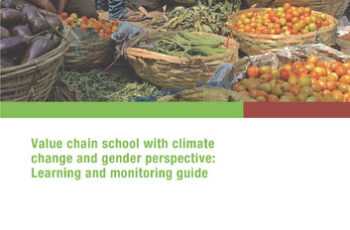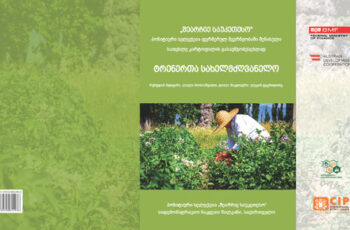Nutritional security, livelihoods and climate resilience in Asia
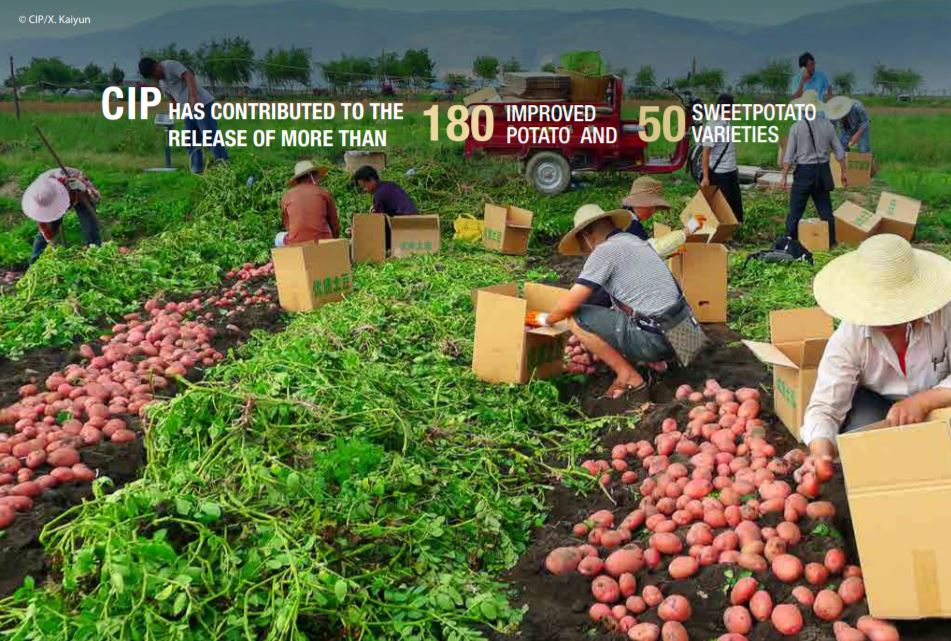
The Asian economy has expanded rapidly in recent years, driven in part by rapid population growth and urbanization. The middle-class population is projected to reach 3.2 billion by 2030, up from 525 million in 2009. During this period, per capita GDP rates in Asia are projected to increase six-fold to reach Europe’s current per capita income. Yet many countries still face significant challenges in achieving the Sustainable Development Goals. The International Potato Center (CIP) seeks to contribute actively to the region’s social and economic transformation, while helping countries cope with challenges, such as COVID-19 and climate change, and influencing the composition of their food baskets to include more nutritious foods. This transformation offers tremendous opportunities to improve the incomes and nutrition security of millions of urban and rural poor and the sustainability of the farming system.
Over the last 40 years, CIP has actively collaborated with national and international partners in Asia. Utilizing the genetic diversity safeguarded at its genebank, CIP has contributed to the release of more than 100 improved potato and sweetpotato varieties in the region. Early-maturing, disease-resistant, heat-, drought- and salt-tolerant potato and vitamin-A-rich orange-flesh sweetpotato varieties have enabled Asian farmers to produce more nutritious and marketable food and adapt to climate change. A recent assessment of potato adoption in seven Asian countries estimated that 2.9 million farm households were growing CIP-related varieties.
The CIP Delhi office acts as a principal hub for activities in Asia, with national offices in China, Georgia, the Philippines and Vietnam. The CIP-China Center for Asia Pacific in Beijing is a modern R&D hub supported by the government and promotes regional south-south cooperation and learning through scientific research, technologies and capacity building. An example is its leadership of AsiaBlight, a regional collaboration of scientists, farmers and other stakeholders to improve the control of potato late blight disease.
CURRENT INITIATIVES
Indian sub-continent
Funder: State government of Haryana (2018–21)
This project aims to increase farmer access to early-yielding, heatand virus-resistant potato varieties and promote sustainable intensification of land use to boost production food security, nutrition and incomes throughout Haryana state. Scientists are selecting suitable potato varieties for multiplication and dissemination and promoting seed production by farmers and specialized enterprises.
Funders: Government of Odisha
While Odisha produces a rice surplus, it only meets 15-20% of potato demand. Due to high seed costs, inadequate storage, poor market linkages and significant price fluctuations, cultivation has dropped massively in recent years. This project provides technical support, including the introduction of early-maturing resilient potato varieties and improved agronomic practices, to improve the incomes of smallholder farmers and to generate employment along the potato supply chain. The introduction of the early-maturing potato will facilitate the planting the tuber crop in between rice harvests. Early trials in Taraboisasan and Khanizpur suggest potential to double the profitability of rice farming by lowering production costs.
Funders: Government of India
In collaboration with scientists from the Central Potato Research Institute, CIP is providing germplasm and assisting with field trials to develop early-maturing and heat-resistant varieties for improved yields for smallholder farmers in Assam and Odisha states. One early potato clone – Kufri Lima – was released in 2017 and farmers are seeing 20% higher yields and profits, as they can plant this variety earlier in the season and fetch premium prices at market. In 2018, CIP provided 20,000 sweetpotato seeds to the Central Tuber Crops Research Institute, where 480 hybrid clones have been developed for further evaluation. CIP is also providing capacity training for scientists to pilot future field trials to develop biofortified varieties.
Funder: State government of Odisha (2013–21)
In its second phase, GAINS aims to to improve food security, nutrition, livelihoods and climate change resilience in Odisha state. Phase I saw sweetpotato production increase by 25% in target districts and productivity rise by 17%. In phase II, farmers cultivating potato and sweetpotato are being connected to processing companies to sell their potato and sweetpotato at higher prices. Cost-effective machinery adopted by farmers should increase incomes by USD 400 per hectare. Selected early-maturing sweetpotato and potato varieties will be released and integrated into sustainable intensified farming systems, enhancing availability of nutritious foods at affordable prices.
Funder: State government of Karnataka (2019-22)
Potato productivity in Karnataka is below the Indian average, yet demand is rising. This new center of research excellence will enable the state to benefit fully from sustainable intensification of potato and sweetpotato production. Through the provision of elite clones and scientific, agronomic and business training, and the introduction of appropriate technologies, CIP will work with local partners to release farmer-preferred, climate-smart, nutritious potato and sweetpotato varieties, and improve markets for them.
Funders: The World Bank (2018–23)
This multi-stakeholder initiative of CGIAR centers and national partners seeks to add value and improve resilience of selected agricultural value chains. CIP works with smallholder farmers in Assam to intensify their production and diversify their income base through the introduction of early-maturing potato into rice-dominated agri-food systems. A zero-tillage approach to growing potato in rice paddies during the winter window between two rice cropping cycles is being tested with smallholder farmers.
Funders: Deutsche Gesellschaft für Internationale Zusammenarbeit (GIZ) (2018–21)
Bangladesh’s fertile delta soils are suffering increasing salinization, which threatens the lives and livelihoods of farmers and others. Building on earlier CIP Bangladesh projects that reached over 100,000 farmers with quality potato and sweetpotato planting material, this initiative is providing agronomic, business and nutrition training. Working closely with the Bangladesh Agricultural Research Institute, 5,000 farmers and 50 community nutrition scholars in six communities, the project will facilitate the adoption of improved diets by some 25,000 individuals, increasing demand for potato and sweetpotato.
Funders: United States Agency for International Development (USAID) (2018–23)
Bangladeshis, particularly women and children, continue to suffer from high rates of malnutrition, hindering socioeconomic development in the country. Taking a multi-sectorial and stakholder approach, this project seeks to strengthen capacity to address the causes of malnutrition by analyzing, designing, implementing, and securing resources for nutrition-sensitive interventions.
Central Asia and Caucasus
Funder: Austrian Development Agency (2017–20)
This project is improving the livelihoods of Georgian farmers and rural communities by increasing the profitability and sustainability of potato farming and building the capacity of national stakeholders in the seed potato value chain. By early 2020, CIP had helped improved the capacities of more than 600 model farmers, extensionists and scientists in seed management, disease identification, integrated seed health, and potato seed degeneration modelling.
Funder: USAID (2019–21)
Working closely with the private sector, CIP is facilitating the adoption of innovative productivity-enhancing technologies for growing the value of smallholders’ potato sales. Through a model farm approach, the project has built a potato farmer network that provides technical and marketing services, knowledge and high-quality potato seed. Participant seed potato producers are expected to increase annual per hectare earnings by 233% while supplying quality seed potatoes to around 15,000 smallholders, which can increase their yields by 66%.
Asia Pacific
Funder: Syngenta Foundation (2016–21)
As climate change threatens food security, there is urgent need for resilient varieties of major crops. This project focuses on breeding early-maturing, stress-tolerant potato varieties to boost the productivity and incomes of farmers across Asia. CIP scientists are working closely with researchers from South Korea and Vietnam to select suitable, disease-resistant parents for breeding. Following crossbreeding at CIP’s Peru headquarters, offspring underwent in vitro screening for heat-, drought-, and salt-tolerance, and advanced clones were selected for further evaluation. The most climate-resilient clones are being selected and multiplied for wider dissemination in South, Central and East Asia, while working with HZPC and other businesses to improve potato production and marketing across the region.
Recent projects
Funders: IFAD (2011–19)
With a combination of research, partnerships and training, FoodSTART+ improved food security and resilient livelihoods among vulnerable communities in India, Indonesia, the Philippines and Vietnam. Working closely with governments and IFAD, the project helped institutionalize a 6- to 10-month farmer business school approach that enabled smallholders to develop and market new products. What started in the Philippines with six pilot schools in 2011 had become 150 schools by 2019 — and 79% of graduates were women. The approach has since been adopted by government agencies and NGOs.
Funder: European Union (2015–19)
Climate change is taking a heavy toll on communities in the mountains of Bhutan, Nepal and Peru. The project sought to increase the capacities of national agricultural research institutions—working with farmers—to develop climate-smart potato varieties with high levels of micronutrients. During the process, scientists learned how to incorporate farmer preferences into future breeding and delivery strategies, which were key to the success of potato breeding.
Funder: USAID (2016–19)
This project helped build resilience to the impacts of climate change, such as drought and warmer summers, through the release of drought- and heat-tolerant potato and sweetpotato varieties. Nutritious orange-fleshed sweetpotato clones were tested on model farms and promoted via school gardens and social programs for young people. Improved potato varieties and management practice increased yields by up to 53%. Enhanced capacities of local partners will drive dissemination of quality planting materials of high-yielding varieties suited to local conditions to reduce malnutrition, increase productivity and improve incomes.

